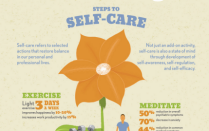Introduction to Self-Care

Whether you are a student or a professional working in the field, self-care matters!
As a student going through an MSW (or other clinical) program, you are expected to balance your coursework, internships, work responsibilities, and home life. As a professional, you face many of these same expectations and challenges. Self-care is a practice that will help you limit the stresses and strains that you are bound to encounter in your academic and professional career and cope with those that do arise.
On this page:
What is Self-Care?
Self-care is an essential social work survival skill. Self-care refers to activities and practices that we can engage in on a regular basis to reduce stress and maintain and enhance our short- and longer-term health and well-being. Self-care is necessary for your effectiveness and success in honoring your professional and personal commitments.
“Just like you do on a plane, you need to put on your own oxygen mask first before trying to help others.” — Nancy J. Smyth, Professor and Associate Dean for Faculty Development
Practicing self-care will help you:
- Identify and manage the general challenges that all hard-working professionals face, such as the potential for stress and burnout or interpersonal difficulties.
- Be aware of your own personal vulnerabilities, such as the potential for retraumatization (if you have a trauma history), vicarious or secondary traumatization (if you work with individuals who report their own traumatic experiences) and compassion fatigue (which you can develop from a combination of burnout and vicarious traumatization).
- Achieve more balance in your life, by maintaining and enhancing the attention you pay to the different domains of your life in a way that makes sense to you.
Aims of Self-Care
Self-care is not simply about limiting or addressing professional stressors. It is also about enhancing your overall well-being. There are common aims to almost all self-care efforts:

- Taking care of physical and psychological health
- Managing and reducing stress
- Honoring emotional and spiritual needs
- Fostering and sustaining relationships
- Achieving an equilibrium across one's personal, school, and work lives
Each of us may differ in the domains we emphasize and the balance we seek among them.
Each life is unique and has its own unique demands. Consequently, we each must determine what self-care means for us and how to apply it in our life.
Overview of Resources
This self-care program has been developed to offer a range of resources.
- We encourage you to start with developing your self-care plan and create a two-part (maintenance and emergency) self-care plan.
Once you have developed your self-care plan, we hope you will explore the many other resources on self-care:
For students: A bit of encouragement
Although it may seem (at this point anyway) that your gaze is locked on the future and your goal is to get through the program and acquire that degree, the truth is that getting through graduate school is a journey not simply a destination. The nature of this journey (which is your life, after all) matters. It matters both in and of itself and also because it is important to your success in reaching your goals. Developing a self-care plan now will help you both during your time in graduate school and in your professional career.
Mindful and consistent self-care is central to preventing or reducing stress, burnout and compassion fatigue and also — importantly — to maintaining and enhancing your well-being now and in the future.
Associate Professor Lisa Butler was quoted about self-care in Social Work Advocates, a publication of the National Association of Social Workers (NASW)
Additional Info
Although all the materials we have included were either prepared by us, contributed by colleagues or accessible online, we have nonetheless endeavored to correctly attribute and obtain permissions (where appropriate) for the materials we have included. If you find materials with mistaken or missing attributions (for which you know the source), or links that no longer work, please let us know.
Additionally, if you find new materials that you think would be helpful to fellow students or colleagues, or have other suggestions for how we can make this site more useful to you, please let us know.
